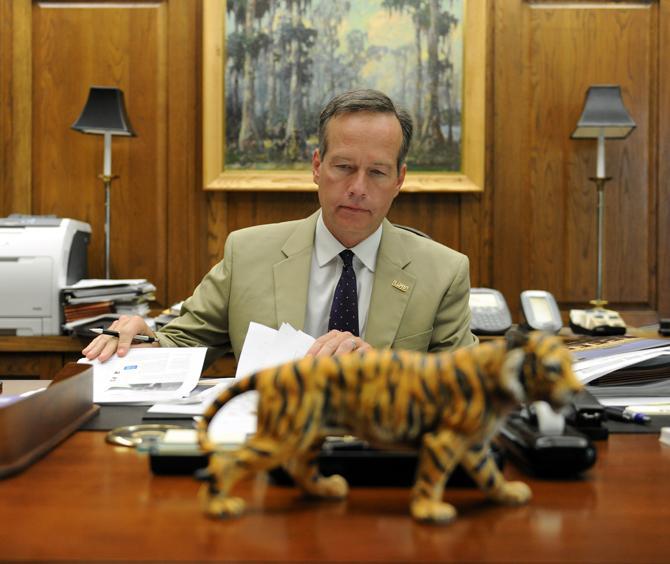When the Board of Supervisors announced former California State University, Long Beach President F. King Alexander would fill LSU’s newly merged president-chancellor position, the decision seemed more positive than negative.
Although many LSU students and faculty knew little about Alexander, his CSULB colleagues weren’t short on favorable comments about their beloved outgoing leader, known on campus as “King.” They said he maintained a focus on students while managing time to double as one of Washington’s top advocates for higher education.
Even LSU’s Faculty Senate President Kevin Cope, who once led the faculty in a vote of no confidence in the Board for their presidential selection, now voices cautious optimism about Alexander following his decision to increase faculty and staff salaries.
Alexander stepped on campus this summer and has now comfortably settled into his mahogany desk at the Offices of the University System.
Unlike former interim System President and University Chancellor William “Bill” Jenkins, who retired in June, Alexander is residing in the president’s office on Lakeshore Drive, located in the Offices of the University System Building, instead of the chancellor’s office in Thomas Boyd.
Alexander’s decision to work out of the System president’s office is telling of how he will handle his combined position. How will Alexander differentiate between his campus and system responsibilities?
“It’s all the same,” Alexander said, when asked about the two roles.
The recent merger of these positions casts doubt on what priority the flagship campus will receive.
When Michael Martin was University chancellor, he made it clear that his focus was on the Baton Rouge campus, but since that position merged with System president, things have changed.
Now, Alexander has a responsibility to every LSU institution, and his time is divided. While LSU Alexandria, Shreveport and Eunice have retained their full-time leaders, the state’s flagship University is sharing its chancellor. And in proper fashion, Alexander has spent much of his time at other campuses.
Although that’s the job Alexander signed up for, it’s not the job the University needs.
LSU’s problems are numerous, and they stem largely from a continuously shrinking state budget.
Tuition continues to increase for both in- and out-of-state students, and until July, when Alexander announced the up-to 4 percent pay raise across the System, most University faculty and staff hadn’t seen a pay raise in four years, contributing to the loss of many top administrators and professors.
While some of the funding for Alexander’s pay raises comes from solid sources like increased enrollment, other funding seems less stable.
These sources include but aren’t limited to a $150,000 donation from the LSU Athletics Department, a rebate from Office Max after the University signed an office supplies contract and money available due to unfilled administrative positions.
The University can’t continue to “cobble together” funds if it wants expenditures like pay raises to be sustainable.
Faculty and staff are already stretched too thin, and we can’t expect them to pick up the slack as positions go unfilled. Robert Kuhn, for example, has undertaken the job of both a CFO and Vice Provost and Associate Vice Chancellor.
What happens next year when LSU inevitably loses more money from the state or when all the vacant positions are filled?
Alexander’s intentions might have been good, but the plan’s execution is questionable.
The problems in this state are too complicated to be fixed solely by lobbying trips to Washington. What we need is an administrator who is willing to stick it out until we can find a permanent solution for our University and other System schools.
While many have suggested that Alexander could use this job as a stepping stone, we hope he uses his power to improve LSU and not just his résumé.
Editorial: F. King Alexander’s actions should be questioned
August 28, 2013
LSU President and Chancellor F. King Alexander looks through papers on his desk Monday, Aug. 19, 2013 in the System Building.






